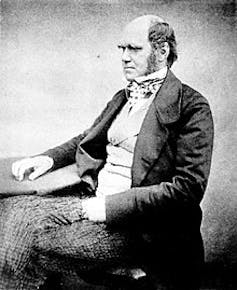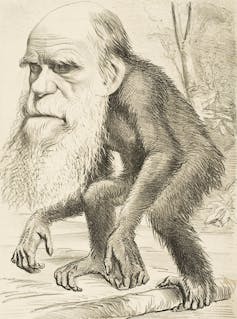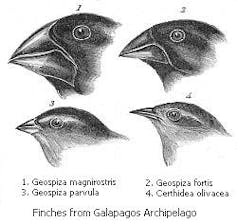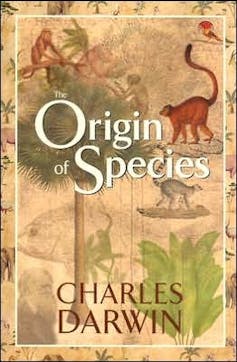How Hard to Read Is the Origin of Species
Charles Darwin's On the Origin of Species (originally published in 1859) shares a pitiful fate with many other classics: it is known to everyone, yet rarely read.
This is a shame, non only because there is much more to Darwin's theory than the familiar principles of mutation, variation, natural choice, and development that accept entered popular cognition as Darwinian buzzwords. The book also gives unique insight into the intellectual milieu in which he developed his theory and his struggles to convince his peers of its veracity.
Indeed in this historic period of the counter-factual and pseudo-factual, acquaintance with the foundations of our scientific tradition — and insights into the struggles of their creation — seems a affair of some urgency.

In the introduction alone, we larn that Darwin commencement conceived of his theory when travelling the world as a naturalist on board HMS Beagle (1831-6), that he had kept collecting data in support of it ever since, that he even wrote a crude draft (he calls information technology "a sketch of the conclusions") many years before, and that he was prompted to publish information technology (twenty years later) only considering his contemporary Alfred Russel Wallace had recently sent him a "memoir" reaching a like conclusion.
The core of the theory, as laid out in the first few capacity of the book, is quickly explained. Plants and animals produce more individuals than nature can sustain in each generation. These individuals vary in looks and in physical and behavioural characteristics, and they are able to pass on this variation to the adjacent generation. Those individuals amend suited to their environs have an advantage and are in turn more probable to survive to give their features to hereafter generations.
Still the bare bones of his theory of evolution are only part of what shapes this book. Darwin also communicates the obstacles he had to overcome to ensure its success and to turn it into what information technology became: a foundational text of the biological sciences that influenced all sorts of other disciplines, including anthropology, religious studies, and the Classics.
Creationism and evolution
At the time Darwin wrote, the prevailing form of caption of the origins of life was creationism, which held that a divine Creator had generated life in all its multifariousness. To creationists, the theory of development offered a rival style of explaining the origin of species – through descent from common ancestors, not a divine agent.

Darwin was well aware that his theory might prove hard to have for those assertive in a Creator. His obsession with the factual was one way of addressing this problem, direct rebuttals of creationism were another. Throughout the book, he repeatedly addresses creationist views and shows that they are incompatible with the show.
Darwin himself was not against the idea of a divine creator. Rather, he sought to situate the scientific reading of the world inside a religious worldview. In the book's decision he states: "I should infer from analogy that probably all the organic beings which have ever lived on this globe accept descended from some one primordial course, into which life was first breathed by the Creator."
This is to say that, while life was starting time created by a God, it subsequently became subject to the laws of mutation, variation, and natural selection – the evolutionary forces described by Darwin.
This really was a congenial move, offering a compromise betwixt religious and scientific explanations of life. Equally long as divine creation occurred prior to and outside of nature and its laws of cause and effect, both explanations could, at least in principle, stand up next. And to some extent it worked. Some of Darwin's contemporaries found that life'southward subsequent chapters to evolve brought out the real spark of the original human activity of creation. Others, withal, did not buy it. To them, Darwin'south theory constituted a frontal assault on religion, the thought of a divine creator, and the tenet that God had created human being in his own image.
An ominous absence
In this context, it is noticeable that in On the Origin of Species Darwin stays well clear of the problematic issue of human descent. If there is a hit omission in the book, it is homo. Darwin originally intended to include a chapter on human development but later on decided against it. As a consequence, the descent of Homo sapiens does not really feature in this elaborate discussion of the forces that bulldoze the evolution of species.

Darwin obviously considered the book controversial enough without agitating his readers unnecessarily by touching on homo evolution. And his instincts did non beguile him: Correct from the day of its publication, the volume became something of a bestseller. Besides right from the first, information technology elicited mixed responses. Some saw it for the foundational piece of work of the biological sciences it somewhen became. Others decried it equally a serious threat to the core of humanity.
Darwin somewhen came to address human evolution in a separate book, entitled The Descent of Homo. Published in 1871, 12 years after On the Origin of Species, this book offered a detailed discussion of human being's descent from ape-like ancestors too as the link between sexual option and human race. Invariably, mayhap, its publication acquired a fresh wave of outrage, criticism, and fence. By then, however, Darwin's theory had already get accepted in sure parts of academe and beyond.
The ability of the factual

Throughout his writing, Darwin sought to counter potential adverse responses to his theory with an onslaught of fact. On the Origin of Species is peppered with examples from the natural world illustrating the principles of evolutionary theory in do.
The struggle for existence, for example, becomes tangible in several seedlings of the mistletoe competing for resources on the same branch of a tree; variation and natural choice has resulted in insects with the astonishing ability to mimic features in their natural surround such as leaves or branches. Correlations between physical characteristics of animals emerge in a whole plethora of minute observations such equally these:
Hairless dogs have imperfect teeth; long-haired and fibroid haired animals are apt to have … long or many horns; pigeons with feathered feet have skin betwixt their outer toes; pigeons with brusque beaks have small feet, and those with long nib large anxiety.
Darwin was well-versed in the zoological and botanical literature of the 24-hour interval. He cites other scholars' works in back up of his theory whenever possible (and all the same curiously, repeatedly apologises for not citing plenty prove). The effect is a rich exposition of life in all its manifestations, which sometimes veers into the finicky – a problem fabricated worse by Darwin's notoriously long sentences – but never loses sight of its central statement.

Darwin's sustained concerns with presenting a disarming instance reveal the kind of reception he anticipated his book would have. He was well enlightened that it had the potential to redefine the foundations of biology. He explicitly says so in the decision: "When the views advanced past me in this volume … are generally admitted, we can dimly foresee that there volition be a considerable revolution in natural history."
And Darwin'southward views certainly did revolutionize. Yet before they could do so, they had to be accepted as fact. To ensure this he evoked the ability of the factual itself.
Ultimately Darwin was successful. Fifty-fifty though these days creationism is witnessing a revival in some circles, no serious educatee of biological science would dubiety that the origin of species (including the human species) is grounded in exactly those evolutionary forces Darwin described.
Evolutionism within and beyond Darwin
As is often the case with the most powerful ideas, Darwin'southward theory of evolution caught on in other areas of thought, too. In particular, during the latter function of the 19th century, all sorts of theories emerged seeking to apply the concept of evolution elsewhere. It became fashionable to speak of the "development" of human societies, for case, or of man cultures, religions – fifty-fifty of the cosmos.

A common explanatory pattern used in this context was the idea that phenomena such as culture or organized religion evolved from elementary ("archaic") forms to more than circuitous ones. And, as i might guess, "more complex' often equated merely with the present, Western culture and society, and the religion that shaped it: Christianity. The ideological indicate of this mode of explanation is hands discerned: Evolutionism here fed into ideas of European superiority, domination, and colonialism.
A particular nasty interpretation of Darwin's theory came to exist known every bit "social Darwinism". It transferred the ideas of a "struggle for existence" and the "survival of the fittest" to homo guild, where they were used equally an statement confronting social benefits for the poor and disadvantaged. In the most serious consequence, this lead to racism, eugenics, forced sterilisations, and the euthanasia of "unfit" people.
Nonetheless this was a blatant misuse of Darwin's theory, which was never meant equally a prescription virtually how to manage a guild. Moreover, ideas about racial superiority lacked any scientific basis and were not shared past Darwin. Quite the reverse: his insights into the common biological foundations of all humanity made Darwin a strong supporter of abolition (the doctrine advocating for the abolition of slavery). People but twisted Darwin'southward ideas to promote their own notions of superiority and the ideological agendas based on them.
Darwin today
Social Darwinism ultimately came to an end because it was unsupported past science. At the aforementioned fourth dimension, ideas about cultural evolution fell out of manner, as did ideas nigh allegedly "primitive" societies. These days, cultures of the past and present are no longer set against each other but appreciated in their own right, without seeking to constitute a bureaucracy between them.
Nevertheless evolutionary theory is yet going potent in disciplines such as computer scientific discipline, medicine, and agriculture. In informatics, "genetic algorithms" solve optimisation problems past mimicking the process of natural pick. In medicine, the looming catastrophe of widespread antibiotic resistance is fundamentally an evolutionary problem: by overusing antibiotics, we have inadvertently favoured those rare bacteria that can withstand our drugs.

To prevent a incomparably bleak future where antibiotics are useless, researchers are increasingly using evolutionary theory to develop new ways of preventing resistance. Cancer, obesity and autoimmune weather condition such as allergies and asthma tin be understood (and possibly treated) through the lens of evolutionary scientific discipline.
Almost 170 years after its kickoff publication, On the Origin of Species and the theory it has come to represent even so define the way in which the biological sciences excogitate the dazzling diversity of life. Its continuing legacy consists in laying out a view of life as "one 1000 system" and in having described the biological mechanisms shaping it.
Nonetheless the book too shows that the ultimate prevalence of the theory of evolution over rival forms of explanation did not come easily. Darwin had to think carefully how to convince his contemporaries of its validity. He had to defend himself against accusations of blasphemy; some of the resulting ridicule targeted him personally.
The traces of this struggle are clearly visible in his work. This alone makes it a must-read for all budding scientists, both existent and armchair.
arnetterepasustem.blogspot.com
Source: https://theconversation.com/guide-to-the-classics-darwins-on-the-origin-of-species-96533
0 Response to "How Hard to Read Is the Origin of Species"
Post a Comment